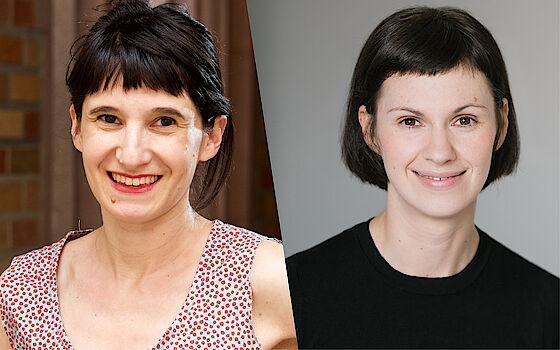Daniela Rosner and Helena Mihaljević are awarded for the best work in the context of the ECDF on gender and diversity issues in the context of digitalisation 2023 - Rosner for the publication „The Bias Cut: Toward a Technopoetics of Algorithmic Systems“ (2022) and Mihaljević as first author of the publication„Towards gender-inclusive job postings: A data-driven comparison of augmented writing technologies“ (2022). The prize is awarded by the ECDF Gender & Diversity Network and is endowed with 1000 Euros each.
Bias and Digitalization
From different perspectives, the two authors are concerned with current practices in dealing with bias in the context of digitalisation. “Bias” refers to distortions based on stereotypes, cultural patterns, gender structures or prejudices, which - when incorporated into data or algorithms, for example - can have a negative and exclusive effect on underrepresented groups when applied. In their work, Mihaljevic et al. take a closer look at software applications that are designed to ensure that job adverts are less gender-biased, i.e., that the wording of job advertisements does not already tend to appeal to male applicants. Rosner takes up meanings of "bias" from the textile sector (e.g., "bias cut") to propose a positive understanding of "bias" as a practice of change in conjunction with digital technologies.
Daniela Rosner: Bias as a starting point for practices of social change
Rosner teaches and researches as Associate Professor in Human Centred Design & Engineering at the University of Washington and is Co-Director of the Tactile and Tactical Design (TAT) Lab. For the scientist associated with the ECDF, it is crucial to focus on gender and diversity. "Gender, along with other axes of social difference (race, disability, religion, etc.), affects the questions we ask and whose bodies, histories and experiences play a role in digitalisation research," says Rosner. In the award-winning text, which focuses on conceptual connections between textile fibres and bits, she proposes a productive and innovative approach to bias. It is not about avoiding or eliminating bias. Rather, they should be used collectively to "work against the grain" in everyday life, as an invitation to change (see Rosner 2022, p. 11). She wants her work to be understood as a challenge to AI analysts to "consider the material impacts and effects of their processes. How is what counts as a dataset, algorithmic process or orientation connected to their material and infrastructural actions, including bodies characterised by gender, race, disability and other categories of difference?" Link to the winning text by Daniela Rosner >>>
Helana Mihaljevic investigates technologies to avoid gender bias in job advertisements
Gender and diversity play a substantial role in the research of Helena Mihaljević, ECDF Professor of Data Science at the Berlin University of Applied Sciences. "I have been researching the underrepresentation of women in mathematical academia for some time now. The evaluation of technologies in terms of fairness, with a focus on gender but also other diversity characteristics, is also my focus," says the scientist. She also categorises the award-winning work in this area. The publication scrutinises technologies that offer automated analysis and formulation aids for job advertisements in order to increase gender inclusion in male-dominated professions or management positions, for example. "We are investigating augmented writing technologies," says Mihaljević, "which automatically generate suggestions for job advertisements so that more women feel addressed by them. In our research, we compared tools in this area and looked at how robust the results they produce are and, more fundamentally, how (well) the translation of scientific results (in this case from psychology and linguistics) into AI technology works." The authors conclude by categorising the translation of research into technology as "extremely complex". In order to evaluate its potential for gender equality, further studies on its application in practice are necessary (cf. Mihaljevic et al. 2022). Link to the winning text by Helena Mihaljević et al. >>>
About the ECDF-AWARD "Digitalization and Diversity"
The prize is awarded annually to the best work that deals with issues of gender and diversity in the context of digitalization. In order to recognize the broad spectrum of the interdisciplinary and diverse work of the ECDF, applications for work results such as exhibitions, installations or other formats are welcome. The prize is endowed with 1000 Euros. Scientists, their staff and students in the context of the ECDF can apply. The deadline is 31 October each year. The award was introduced in 2023 and presented twice during the inaugural round. //Additional information

